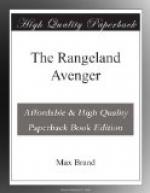Four Pines had accepted the tale. There had been more deadly stories than this connected with the desert. But Pop Hansen, the proprietor, drew Lowrie to one side.
“Keep out of Riley’s way for a while. He’s all het up. He was fond of Hal, you know, and he takes this bad. Got an ugly way of asking questions, and—”
“The truth is the truth,” protested Lowrie. “Besides—”
“I know—I know. But jest make yourself scarce for a couple of days.”
“I’ll keep on going, Pop. Thanks!”
“Never mind, ain’t no hurry. Riley’s out of town and won’t be back for a day or so. But, speaking personal, I’d rather step into a nest of rattlers than talk to Riley, the way he’s feeling now.”
Lowrie climbed slowly up the stairs to his room, thinking very hard. He knew the repute of Riley Sinclair, and he knew the man to be even worse than reputation, one of those stern souls who exact an eye for an eye—and even a little more.
Once in his room he threw himself on his bed. After all there was no need for a panic. No one would ever learn the truth. To make surety doubly sure he would start early in the dawn and strike out for far trails. The thought had hardly come to him when he dismissed it. A flight would call down suspicion on him, and Riley Sinclair would be the first to suspect. In that case distance would not save him, not from that hard and tireless rider.
To help compose his thoughts he went to the washstand and bathed his hot face. He was drying himself when there was a tap on the door.
“Can I come in?” asked a shrill voice.
He answered in the affirmative, and a youngster stepped into the room.
“You’re Lowrie?”
“Yep.”
“They’s a gent downstairs wants you to come down and see him.”
“Who is it?”
“I dunno. We just moved in from Conway. I can point him out to you on the street.”
Lowrie followed the boy to the window, and there, surrounded by half a dozen serious-faced men, stood Riley Sinclair, tall, easy, formidable. The sight of Sinclair filled Lowrie with dismay. Pushing a silver coin into the hand of the boy, he said: “Tell him—tell him—I’m coming right down.”
As soon as the boy disappeared, Lowrie ran to the window which opened on the side of the house. When he looked down his hope fled. At one time there had been a lean-to shed running along that side of the building. By the roof of it he could have got to the ground unseen. Now he remembered that it had been torn down the year before; there was a straight and perilous drop beneath the window. As for the stairs, they led almost to the front door of the building. Sinclair would be sure to see him if he went down there.
Of the purpose of the big man he had no doubt. His black guilt was so apparent to his own mind that it seemed impossible that the keen eyes of Sinclair had not looked into the story of Hal’s broken leg and seen a lie. Besides, the invitation through a messenger seemed a hollow lure. Sinclair wished to fight him and kill him before witnesses who would attest that Lowrie had been the first to go for his gun.




